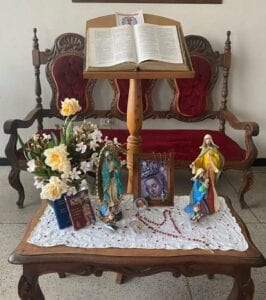For the first time in our life, we live in an era of forced “Eucharistic fasting,” due to the anti-coronavirus pandemic. The Eucharist certainly is the center of Christian life. It is a community experience and a celebration of our faith, and a source of comfort, consolation and strength. That is why the present situation is indeed a painful and sad situation for many faithful. Most of the dioceses have made arrangements to broadcast the Eucharistic celebration on television and over internet … something that is good during this extraordinary situation. However, it is also an opportunity to focus on some of the less emphasized aspects of our faith. It is a time for us to receive the incarnated Word in the Word that is presented to us in the Scriptures. It is a time return to and open the Bible instead of waiting to listen to the Word of God during some Eucharistic celebration.
 From time to time, the Church has always taught the faithful to encounter and receive Jesus in the Word of God. The Second Vatican Council affirmed that ”the Church has always venerated the divine Scriptures just as she venerates the body of the Lord, since, especially in the sacred liturgy, she unceasingly receives and offers to the faithful the bread of life from the table both of God’s word and of Christ’s body. She has always maintained them, and continues to do so….. “(Dei Verbum, n. 21). St. Jerome says, “We eat the flesh and blood of Christ in the Eucharist, but also in reading the Scriptures … I consider the Gospel the body of Christ.” Ignatius of Antioch writes: “We must approach Scripture as the flesh of Christ” and Maximus writes: “By means of every word written in the Bible, the Word becomes flesh.” Caesarius of Arles writes: “Whoever listens in a careless way will be as guilty as he who negligently let the Body of the Lord fall to the ground.” This is why the Fathers speak of “Breaking the Word” in the same way as the Eucharistic Bread is broken.
From time to time, the Church has always taught the faithful to encounter and receive Jesus in the Word of God. The Second Vatican Council affirmed that ”the Church has always venerated the divine Scriptures just as she venerates the body of the Lord, since, especially in the sacred liturgy, she unceasingly receives and offers to the faithful the bread of life from the table both of God’s word and of Christ’s body. She has always maintained them, and continues to do so….. “(Dei Verbum, n. 21). St. Jerome says, “We eat the flesh and blood of Christ in the Eucharist, but also in reading the Scriptures … I consider the Gospel the body of Christ.” Ignatius of Antioch writes: “We must approach Scripture as the flesh of Christ” and Maximus writes: “By means of every word written in the Bible, the Word becomes flesh.” Caesarius of Arles writes: “Whoever listens in a careless way will be as guilty as he who negligently let the Body of the Lord fall to the ground.” This is why the Fathers speak of “Breaking the Word” in the same way as the Eucharistic Bread is broken.
 This forced time of “Eucharistic fasting” is an opportunity for everyone to rediscover that, according to the dictates of Vatican II, the Bible can become everyone’s nourishment. Families could meet together on a daily basis, take the readings of the day, read them, reflect on them and conclude with a time of prayer (offer specific intercessions to God). For religious men and women, the Liturgy of the Hours could once again be given its role of celebrating the mystery of Christ in the rhythm of the day, that is, to make visible the presence of God in daily life. In doing so this time of physical distancing can also be a time of particular encounter with Jesus who is present in the Scriptures as well as in the Eucharist.
This forced time of “Eucharistic fasting” is an opportunity for everyone to rediscover that, according to the dictates of Vatican II, the Bible can become everyone’s nourishment. Families could meet together on a daily basis, take the readings of the day, read them, reflect on them and conclude with a time of prayer (offer specific intercessions to God). For religious men and women, the Liturgy of the Hours could once again be given its role of celebrating the mystery of Christ in the rhythm of the day, that is, to make visible the presence of God in daily life. In doing so this time of physical distancing can also be a time of particular encounter with Jesus who is present in the Scriptures as well as in the Eucharist.
This time of quarantine could become a time to remember God, a time to strengthen our relationship with God, remembering the words from the Book of Deuteronomy: people do not live on bread alone but on every word that comes from the mouth of God” (Dt 8,3).
Augustine Elayanikkattu Abraham Siby CM
Southern Indian Province.
Congregation of the Mission.
Source: https://cmglobal.org/





0 Comments